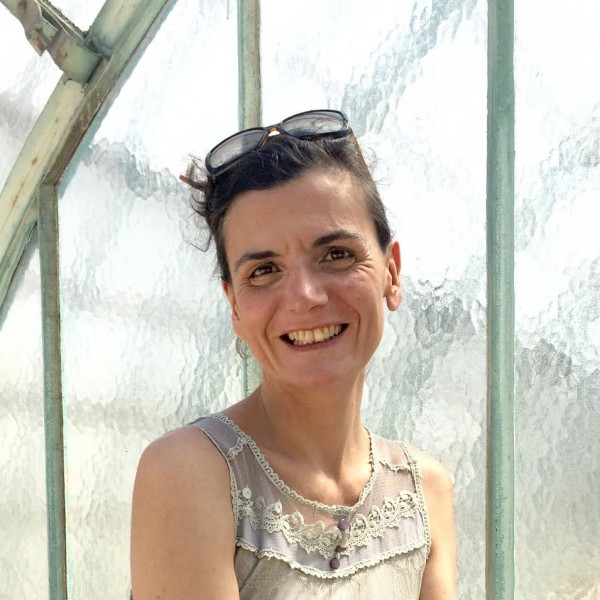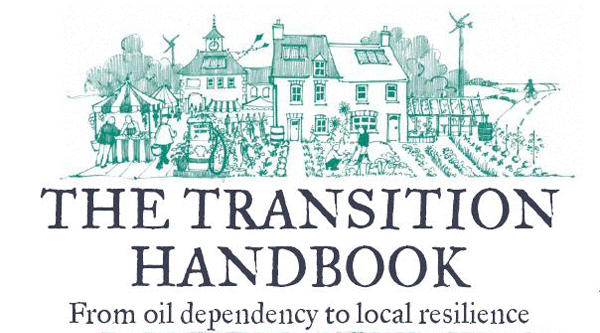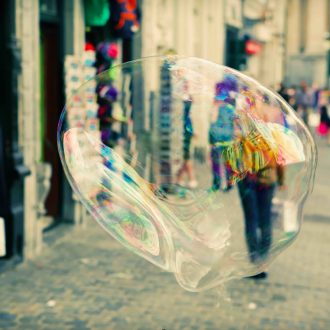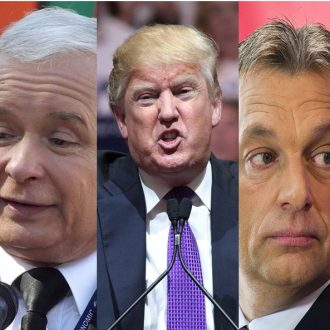The majority of us are now aware of the huge impact that human behaviour is having on the environment. Experts agree that urgent action is required to tackle the global warming crisis. Yet with only weeks remaining before the COP21, the 2015 Paris Climate Change Conference, the environment is still low on the French public’s list of priorities, lagging behind unemployment, crime and the economy in the national consciousness (Ipsos poll). The long-term survival of humanity, and possibly even our survival in the much nearer future, appears to be leaving the French public cold.
So why aren’t people more interested? Is it because of the way the media covers environmental issues? Is it because of the words we use to describe our relationship with nature?
How can we tell people about this life-threatening issue that requires us to find a collective solution? Place to B features a series of interviews entitled “Storytelling & Ecology”.
Feature by Eve Demange.
“The environmental crisis is a crisis of mythology”
The series begins with an interview with the French scholar Isabelle Delannoy whose research focuses on the symbiotic economy. A widely published writer and co-author of the film “Home”, Isabelle Delannoy is a committed environmentalist.
Place to B: Environmental issues still seem to struggle to find their way into the public consciousness today. How do you explain this problem?
Isabelle Delannoy: It’s because we’re locked into a paradigm. The words we use to talk about the environment reflect an outmoded way of thinking. Human civilization is undergoing profound transformation, fundamental change on a global scale. A civilization is a complex structure combining knowledge, cultures and human representations of the way people understand the world around them. If we want to explain the new world as it is becoming today, then we need to find new words to do so.
PtoB: How can we find these new words?
ID: Well that’s the crux of the issue. How can we explain the unknown using our existing vocabulary? In a recently published academic article1 I develop the idea that the environmental revolution is actually a revolution of aesthetics. In other words, we need to alter our way of seeing and consider what we think we’ve always known from a different perspective. If you relate to the changes taking place through your senses and understand them through lived experience, then you’re going to reach a more personal level of understanding.
PtoB: Could you explain that in more detail?
ID: Two different examples illustrate directly what I’m trying to say. The Mobility Carsharing project in Geneva has 100,000 members who share the use of 3,000 cars. In towns and cities, this type of scheme is providing a new model of behaviour that is going to lead to reduced traffic levels. People will experience the benefits directly and physically in terms of their own health and wellbeing.
The second example is about plurality of landscapes. At present the vegetation in our urban parks is non-productive, and sometimes even toxic, as we see with ornamental plants such as oleander. But imagine if in the future our towns and cities were full of edible plants. Imagine if everywhere you went you could smell fresh herbs and touch trees laden with fruits – apples, pears, plums, hazelnuts and walnuts.
The town of Totnes in England has already embarked upon this transition. The community has brought food production back to a local level. Other towns are doing the same with water and energy. Our urban parks have the potential to become centres of food production for town-dwellers and could also be used to purify wastewater.
The major hurdle is the way that the environment is always viewed from the perspective of constraints and with cost cited as a deterring factor. But if we take the view that the living – I choose the word deliberately – has innate intelligence, suddenly the constraints are transformed into opportunities.
PtoB: But why is it so difficult for us to see the gifts that nature offers us?
ID: In our way of thinking about nature, the living world is perceived as a resource to be exploited, as nothing more than an external landscape, a provider of raw materials. The idea that plants can be more effective than us in performing certain tasks is proving completely revolutionary in terms of the way we conceptualise the relationship between humans and nature.
The idea that humans are separate and distinct from nature has distant origins. The three monotheistic religions – Christianity, Judaism and Islam – all carry this idea. We find it in Genesis in the creation story, “…the LORD God formed every beast of the field and every bird of the sky, and brought them to the man to see what he would call them” (Genesis 2:19). Humans are placed above and beyond creation. They preside over other living beings. This idea is also present in Ancient Greek philosophy. The Greek word Nomos means name but it also means management. Reason takes precedence over everything. Perception, emotions, and all that is considered natural are at the bottom of the hierarchical pyramid. Women and farmers are lowest on the scale of values while men, spiritual enlightenment and intellectual thought are situated at the top.
The Renaissance thinkers continued this tradition. Descartes developed the idea of Man as “master and owner of nature”. If you reduce the status of the living world to the role of a production component then you have to desacralize it: the situation is otherwise morally untenable.
PtoB: But isn’t that idea being turned on its head by scientific findings, environmental illnesses and the climate crisis?
ID: Yes, we are becoming more aware of the fact that we humans are living beings within the living world. Since the early 2000s cancer levels have rocketed and we have come to realise that what we do to the living world, we also do to ourselves. We’ve begun to understand that the outside world is also within us, that there is no separation. With the advent of biomimetics, for example, we carry out research differently today. We draw upon systems in the living world to forge our own inventions and solutions.
We now realise that our vision of the world was wrong. The human vision of the world order is founded upon mythology. The ecological crisis is a crisis of mythology; today we are breaking with the paradigm of several millennia. Reconnecting with the living world sweeps away imaginary representations and changes the way we think about our relationship with the world order. We cannot contemplate this transformation using the vocabulary we have today. Words become artifacts of thought: obstacles that prevent us from engaging with reality.
PtoB: how could the media assimilate this conceptual change?
ID: When talking about ecological issues, you have to seek the common ground among the people you want to bring together. In the film Home, with its aerial images, Yann Arthus Bertrand offers us a different perspective, that we all live on the same planet. When we wrote the script for the film, we started with, “you’re like me, a Homo sapiens.” Homo sapiens erases cultural diversity. It’s a source of wealth and of hope.
Then we wrote, “life, our life, is just a link in a chain of innumerable living beings”. But if you replace this phrase by “life, our life, is just a link in the chain of nature”, you see that from the outset, the word “nature” induces separation from humanity. And this separation does not exist in “living beings”.
Images can overcome the problem; they enable us to consider the same reality from a different perspective. In my presentations of the symbiotic economy, I show designs for magnificent parks with people having fun and next to them I write, “waste water treatment plant”. This enables me to bring together ideas that we don’t usually associate with one another. And that’s where you can introduce a new paradigm.
A slide designed to inspire audiences: a bucolic landscape of a wastewater treatment plant in Shanghai.
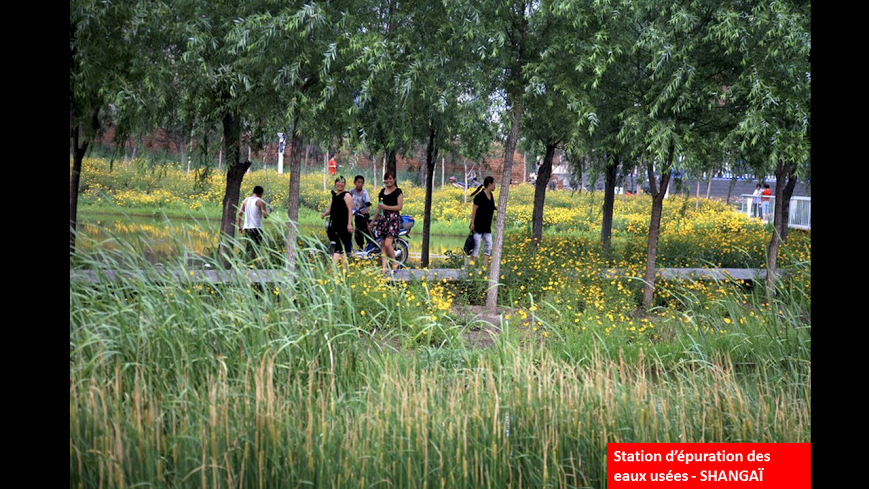
A slide to make the participants react: a bucolic landscape of a wastewater treatment plant in Shanghai
PtoB: Do you think that the internet can play a role in this transformation of language, in the linguistic and narrative creativity needed to give expression to this new way of thinking?
ID: The internet gives people the opportunity to regain control of the narrative of our unfolding future. We expect our leaders to change the system yet we are all responsible for achieving this change. If we continue to create narratives where a higher authority in a pyramidal power structure is our point of departure, then everything seems blocked and far removed from ordinary folk. But if we dismantle this configuration, then we see that everything shifts.
If we want to change our story, we must distance ourselves from the pyramidal paradigm and remain connected to the living world. We have to find words to convey the innate intelligence of the living world and communicate the ways that humans can restore beauty to their ecosystem. We should speak of humans as the positive species.
Interviewed on 09/17/2015
1 On Being Living Beings – Renewing Perceptions of Our World, Our Society and Ourselves, French Animal Thinkings, Michigan State University Press, pp. 135-148, April 1st 2015.
Translation by Rachel Robertson

